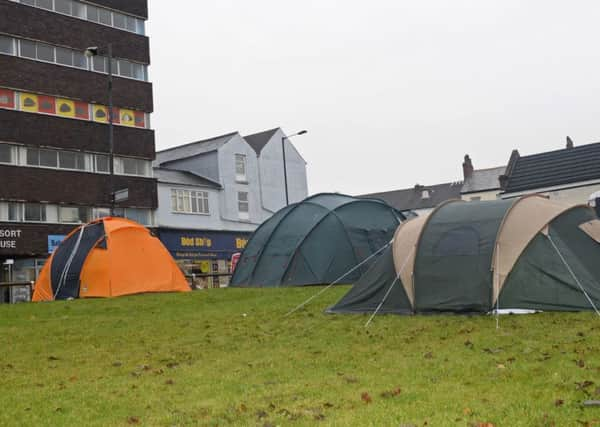Chris Whitwood: Tent City is both a warning sign and a ray of hope


Members of the public giving food and sleeping equipment, volunteers giving up time and energy, and a community amongst the residents themselves because, as it says on one of the tents, they are ‘Homeless but not Hopeless’.
To some, the tent cities popping up in many towns across Yorkshire are another alarm bell to the political establishment that all is far from well.
Advertisement
Hide AdAdvertisement
Hide AdHowever, they are also a sign of something more positive – local communities coming together to highlight and attempt to find a solution to an issue that affects all of us. And homelessness does affect all of us.
From the business owner coming into work to discover someone has spent the night on the doorstep, to the weekend shoppers who want to go into town with their family without being asked if they could spare any change, the repercussions of failing to tackle homelessness reach beyond just the individual who is sleeping rough.
In Doncaster, it is estimated that around 70 people are sleeping rough at any one time. Addressing homelessness and its root causes must therefore transcend traditional political divides; party politics, left or right, leave or remain. It doesn’t matter where you sit on the political spectrum, breakfast means breakfast. The Tent City is an example of members of the community coming together to provide those less fortunate than themselves with warm clothes, a safe place to sleep, and breakfast.
If we are to tackle homelessness effectively, it is imperative that we tackle its root causes. There is a stereotype that anyone who is homeless is a drug addict or alcoholic. While it would be naive to pretend this is never a factor, there are also a number of other causes: lack of job security resulting from short term or zero hours contracts, issues around mental health and sudden changes in personal circumstance.
Advertisement
Hide AdAdvertisement
Hide AdThe city of Medicine Hat in Alberta, Canada, has substantially reduced homelessness amongst its 61,000-strong population by adopting a policy of ‘Housing First’. According to the city’s Mayor, Ted Clugston: “It used to be,‘You want a home, get off the drugs or deal with your mental health issues… But if you’re addicted to drugs, it’s going to be pretty hard to get off them, if you’re sleeping under a park bench’.”
This statement has been echoed by volunteers at Doncaster Tent City. One explained that the tent city had helped reduce drug and alcohol use: “It’s because they’re in a friendly environment. They can talk to each other about it. They’ve not got that issue with having to sit on the street all day and look for food and money for the drugs and ale because, the simple reason is, they’re forgetting about it. Their mind occupied by something else; by cleaning the camp or helping us give food and things like that.”
One homeless resident of Doncaster’s Tent City stands out in my mind in particular. When we first met he was scruffy; his beard was unkempt and he looked (and to be brutally honest, also smelled) unwashed.
The second time I met him, I didn’t recognise him. He was clean shaven, dressed in warm clothing and, most noticeably of all, held himself with a rediscovered air of hope.
Advertisement
Hide AdAdvertisement
Hide AdHe had neither an addiction nor mental health issues. As a result, he had been told that he was ineligible for some of the support being arranged for others in the Tent City. The welfare state provides a safety net, yet the problem with nets is that sometimes people slip through the gaps. While praising the overwhelming generosity of the public and acknowledging Doncaster Council’s efforts – permitting the use of council land for the Tent City and providing temporary sanitation – he expressed a sense of having been left in limbo: “We’re not living here. We’re existing. This isn’t any way to live.”
That is why the Yorkshire Party is calling on Doncaster Council to rehouse all residents of the Tent City and to provide mental health and social service support for those who need it, so the site can be closed by Christmas (readers can sign the petition at www.YorkshireParty.org.uk/doncaster).
If we want to make Yorkshire a better place and build a brighter future for everyone, it’s up to us to work together to make it happen. Even though the tent cities offer only a short term solution to a much longer term problem, they show that people in their local area, working together as a community, can begin to make a real difference.
Chris Whitwood is deputy leader of the Yorkshire Party.